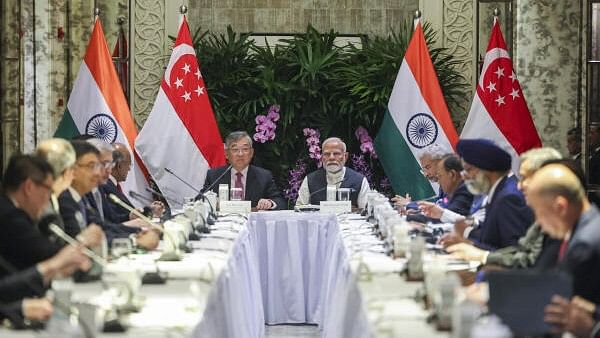
Prime Minister Narendra Modi with Deputy Prime Minister of Singapore Gan Kim Yong, Union External Affairs Minister S Jaishankar and others during a meeting with business leaders and CEOs of Singapore.
PTI
New Delhi: Singapore will help set up and manage semiconductor manufacturing hubs in India and launch customised skill development courses to prepare a large workforce for the sector.
As Prime Minister Narendra Modi met his counterpart Lawrence Wong in Singapore on Thursday, the two sides signed a Memorandum of Understanding launching the bilateral Semiconductor Ecosystem Partnership. The MoU between the Ministry of Electronics and Information Technology of the Government of India and the Ministry of Trade and Industry of the Government of Singapore will make it easier for New Delhi to encourage the city state’s semiconductor companies to invest in the South Asian nation.
“Semiconductors and technology are important facets of India-Singapore cooperation,” Modi posted on X after he and Wong visited a manufacturing facility of AEM Singapore Pte. Ltd. in the Southeast Asian city-state. Singapore’s prime minister echoed his counterpart from India, noting that the two nations were “strengthening cooperation in new areas, such as advanced manufacturing and semiconductors”.
The two prime ministers agreed that advanced manufacturing, particularly in developing “resilient semiconductor supply chains”, could be “a new pillar of bilateral cooperation”, according to a joint statement issued after the meeting.
Modi’s government launched the India Semiconductor Mission with a total financial outlay of $10 billion as a part of the programme for the development of sustainable semiconductor and display ecosystems in the country. The programme was designed to provide financial support to companies investing in semiconductors, display manufacturing, and design ecosystem. The government is now planning a second phase of the programme, with an additional outlay of $15 billion.
Singapore contributes to around 10% of global semiconductor output, 5% of global wafer fabrication capacity, and 20% of semiconductor equipment production. The semiconductor sector contributes to 8% of the economic growth of the city-state, where nine out of the 15 top chip-making firms have set up shops. The land and labour shortages in Singapore can impede growth in the sector and that is why India wants the semiconductor industries of the Indo-Pacific nation to expand to India.
Modi and Wong elevated the relations between India and Singapore to a comprehensive strategic partnership. They also witnessed the signing of three other MoUs for cooperation in skill development as well as in digital technologies and the healthcare sectors.
The prime minister during the meeting with his counterpart highlighted that Singapore, with an investment of around $160 billion, was a leading economic partner for India. He further noted that rapid and sustained growth in India has opened up immense investment opportunities for the companies of Singapore. They also reviewed existing cooperation in the fields of defence and security, maritime domain awareness, education, Artificial Intelligence, Fintech, new technology domains, science and technology, and knowledge partnership. The two leaders called for strengthening connectivity between the countries to enhance economic and people-to-people ties. They also called for acceleration in green corridor projects.
Modi had a meeting with the business leaders of Singapore and assured them that India would increase the pace and scale of infrastructure development in his third term at the office of the prime minister. He apprised the CEOs of new opportunities in the fields of railways, roads, ports, civil aviation, industrial parks, and digital connectivity.
